Attitude towards minorities is an important indicator of Ukraine's readiness to accede to the EU
Attitude towards minorities is an important indicator of Ukraine's readiness to accede to the EU. This is what Katarina Maternova, EU Ambassador in Ukraine, has told Ukrainian Radio during the international conference entitled "Restoration of Ukraine and Prospects of Civil Society of Ukrainian Romanis". The conference took place recently in Kyiv and was organised by ARСA Youth Agency for the Advocacy or Romani Culture, Ukrainian State Service for Ethnic Policy and Freedom of Conscience and the Central Council of German Roma and Sinti. It was also supported by the Representative Office of European Union in Ukraine and the German Foreign Office. The Conference was attended by its participants: international partners as well as over 15 Romani NGOs. Jointly, they discussed the issue of human rights in Ukraine, the actual condition of Romani community, and the matter of provision of support to Romanis during full-scale war. Particular focus was made upon Romanis residing in Kharkiv, Donetsk, and Kherson Provinces (frontline regions) who have become internal refugees. The conference was attended by Svitlana Mialyk.
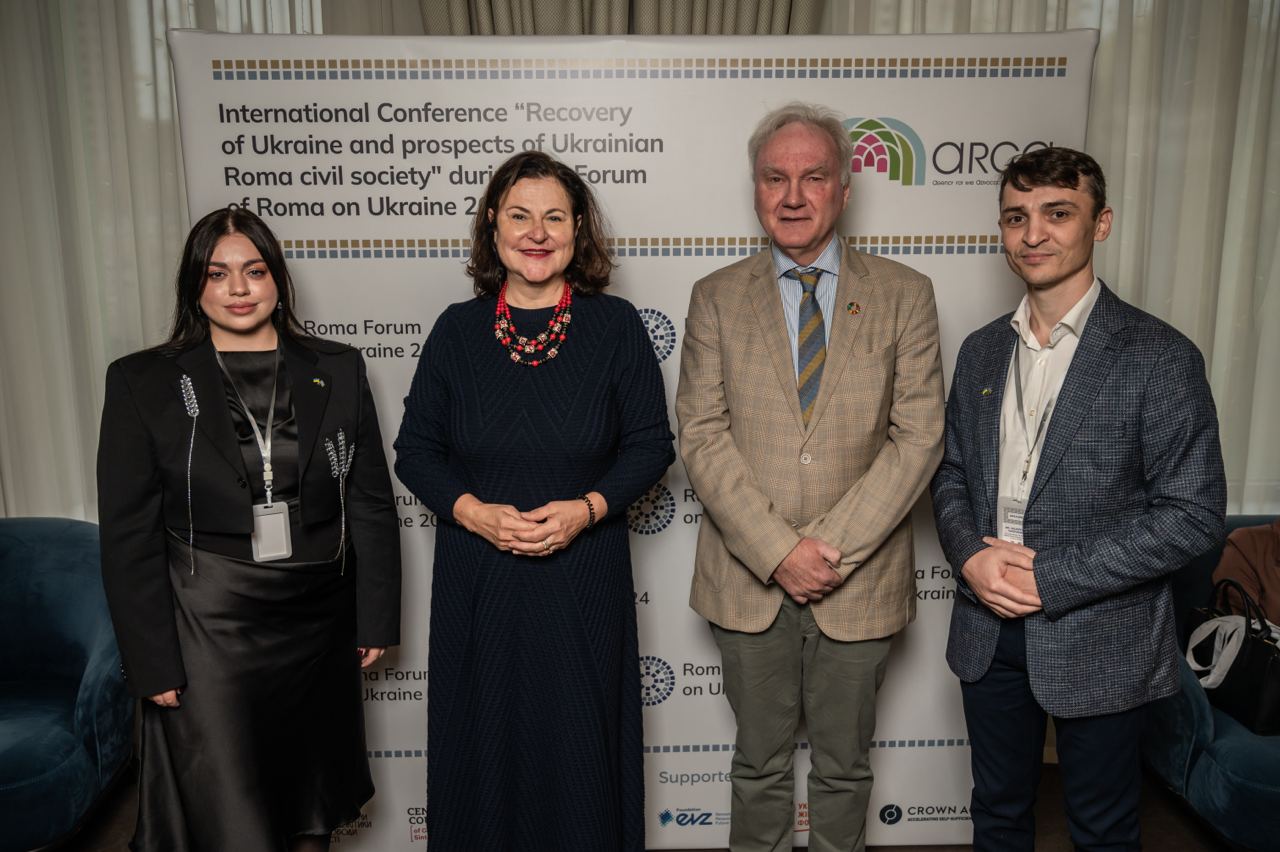
Ukraine's integration in the EU depends upon how decently it treats its ethnic minorities
Unlike Foras of the previous years, this year's Third Forum of Romas took place not in Europe but in Ukraine. One of events within its framework was the international conference on the condition of the Romani civil society and the meeting between Romani NGOs with international partners. The Conference was opened by Katarina Maternova, EU Ambassador in Ukraine. Ambassador Maternova has stressed that Romanis are perhaps the largest ethnic community in the world that do not have a country of their own—and are hence treated as if they were invisible. No Romani Embassy exists which you could call and complain about something or simply seek advice. And yet, whenever a crisis emerged, it was always Romanis who were its first victims. This is why we want to conduct a research here, in Ukraine: in order to be able to see the actual situation. Until and unless we have a clear picture, we shall not be able to shape a policy or a strategy, said Ms Maternova. In her exclusive comment provided to the Ukrainian Radio, Madame EU Ambassador has stressed that the situation with ethnic minorities in Europe and Ukraine is not too different, as there is plenty of stereotypes in EU, too.
Katarina Maternova, EU Ambassador in Ukraine:
"For me, Ukraine is a historically rather multicultural country and, to be honest, there are many countries in the EU that have serious problems with their attitude towards ethnic minorities. I think that the legislative acts that have been adopted in Ukraine are very important steps in this direction. We, in the EU, are observing this and are going to consider it. After all, Ukraine's integration in the EU also depends upon how decently it treats its ethnic minorities. We are aware of the fact that war impacts everyone; still, a number of steps have already been taken and we hope that you will continue working in the same direction".
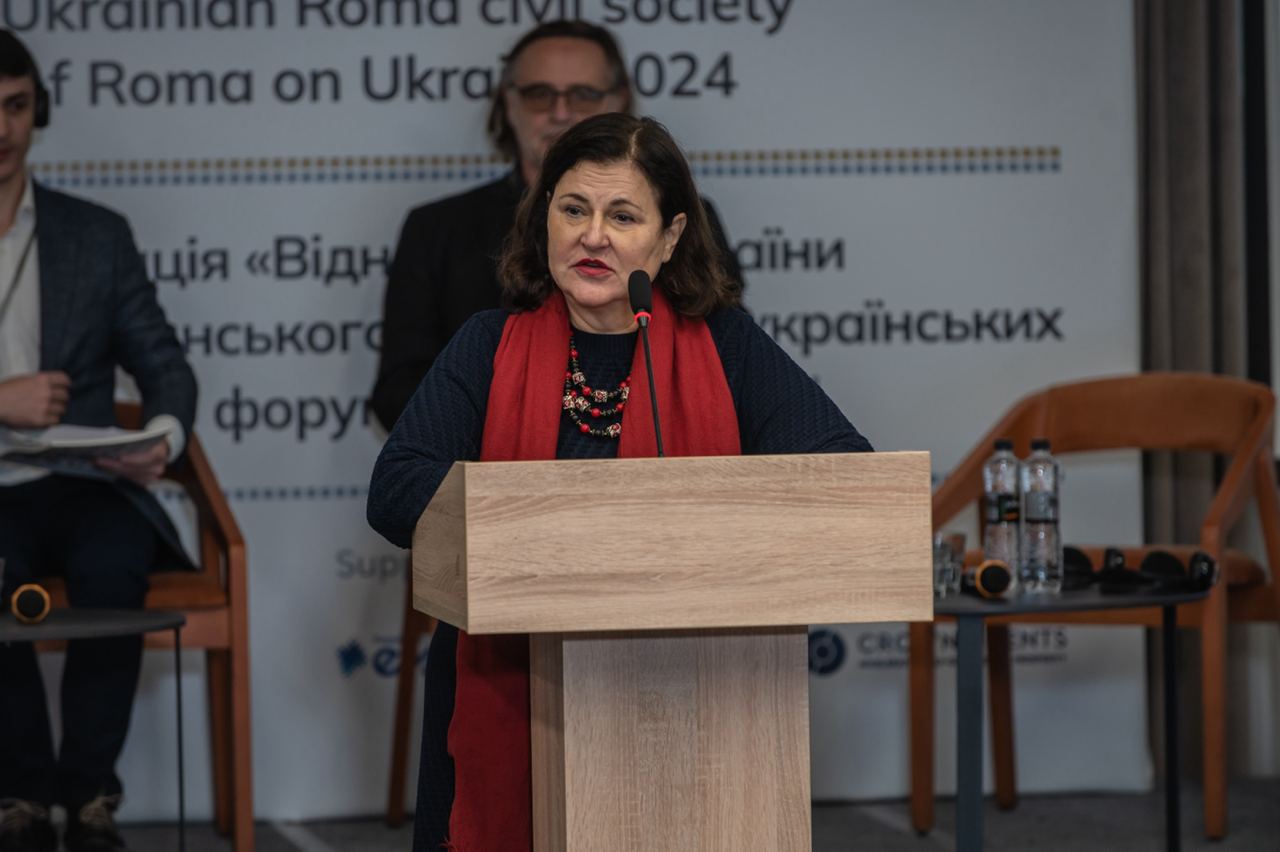
Before the Great War, there were 400,000 Romanis living in Ukraine, representing 15 various ethnic groups
Nataliia Tomenko, Deputy Director of ARСA Youth Agency for the Advocacy of Romani Culture, has stressed that, according to unofficial data, before the full-scale Russian invasion, there were over 400,000 Romanis living in Ukraine, representing 15 different ethnic subgroups differing in terms of their cultural and social characteristics. Since February, 2022, over 100,000 persons became internal refugees or fled the country. These are data provided by the Office of Ukrainian Parliamentary Ombudsman. Apparently, on a percentage basis, Romanis have become the largest ethnic group of Ukrainian migrants, says Nataliia Tomenko.
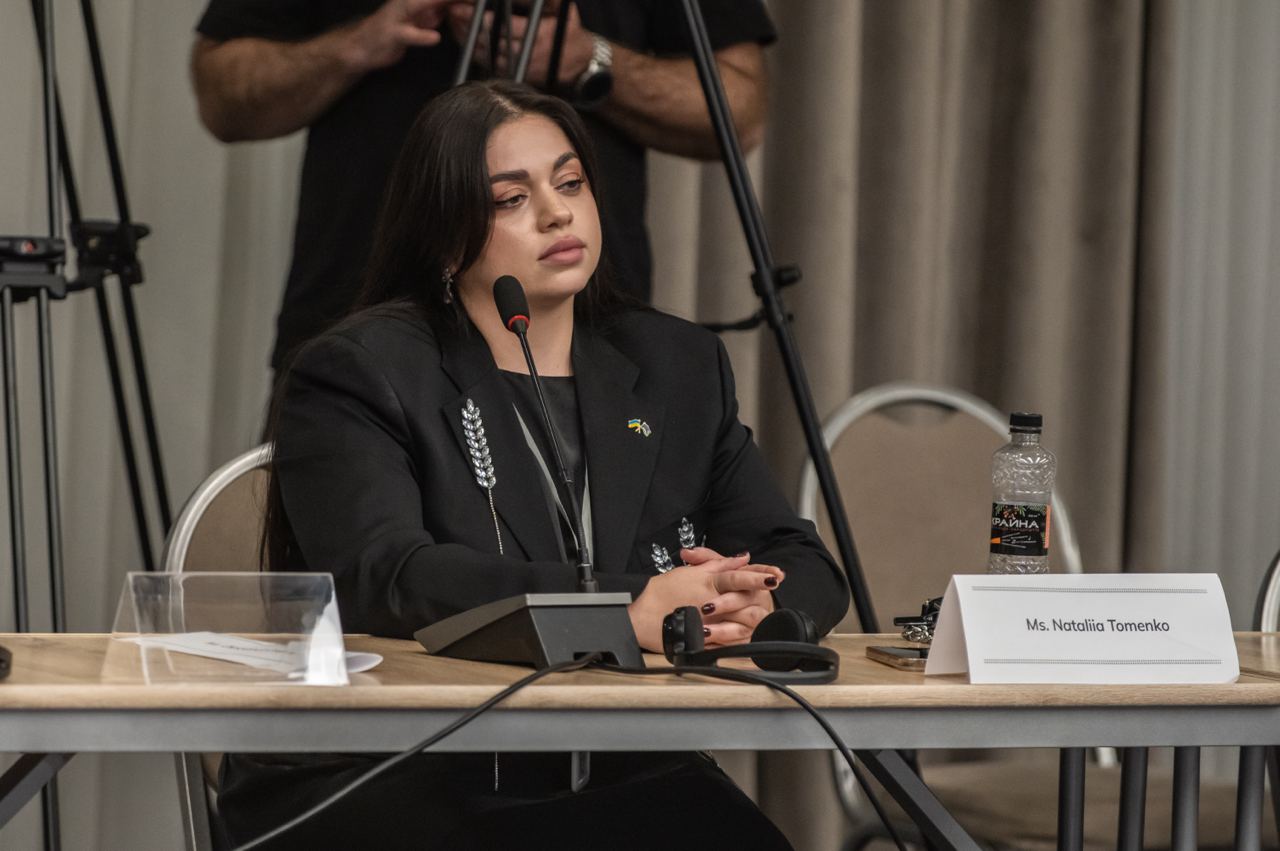
A number of issues were put on the agenda of the conference and the participants discussed how important these issues were for the authorities: the anti-Gypsyism, discrimination, internally displaced Ukrainian Romanis, Romani refugees?
Ihor Losovskyi, Deputy Chief of Ukrainian State Service for Ethnic Policy and Freedom of Conscience:
"We are in fact the central executive body which is actually tending to these matters: ethnic minorities in Ukraine—including the Romani ethnic minority. Romani issues are one of our priority issues. Our priority number one is to design legislation that would bring our legislation in compliance with EU legislation, as we plan to accede the EU. The matter of Ukraine's indigenous peoples is our priority, thus we focus on Crimean Tatars, Karaims, Krymchaks, and Romanis. Romanis are the priority of humanitarian, international, and state institutions all across Europe, as Romanis are perhaps the most suffering community which is present everywhere, not just in Ukraine. This is also the case in rich countries like France or Germany. We have studied how the Germans and the Danish have been protecting their ethnic minorities. There, we had a meeting with local Romanis. The Romani community has established itself in Germany some 400 years ago. They, too, have problems of their own and have a way of life of their own. That said, most of them dwell in flats (apartments). Two years ago, I was in Berlin and saw a Romani encampment. The Germans told me that it was a homage to Romani historical way of life. There is, so to say, a historical subgroup of Romanis who continue showing the world how it is or was to live in an encampment. In each and every country of Europe, Romanis are a special case and are treated in a special manner, as their lifestyle is quite unconventional. Each democratic society—and that pertains to Ukrainian society, too—wants the Romani community to integrate as soon as possible—not in the terms of abandoning/losing its cultural peculiarities but in terms of achieving the same level of education and the same way of life as any other Ukrainian citizens have, so that representatives of the Romani community would be able to use all that".
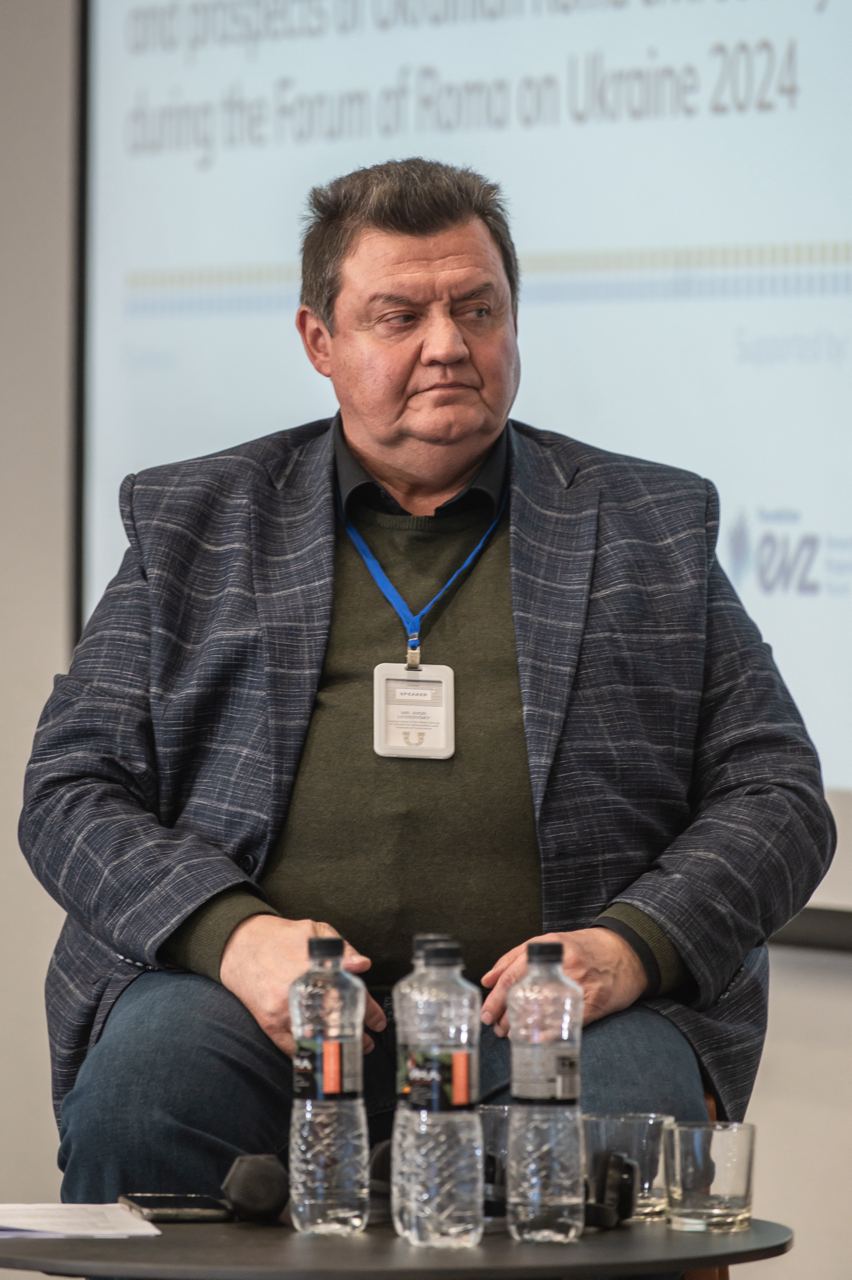
—You told us that problems of Romanis in Ukraine and abroad are alike. How much more acute do you feel these problems are in Ukraine?
—There is war underway in Ukraine. Most Romanis from Eastern Ukraine have either become refugees or internally displaced persons. Most of them have settled down in Western Ukraine—predominantly in Transcarpathia Province. The problem consists in the fact that they have abandoned their residences. All due to the war. This is the principal problem which makes the lives of Romanis even more complicated than it used to be in peacetime.
Ukraine as a multi-ethnic political nation
Yevhen Magda, a historian and Director of the Institute of Global Politics:
"I think we should come to understand the fact that reconstruction is not going to happen overnight. It is going to be more like a puzzle which we are going to be solving together, through common effort. In order for us to be able to fight more efficiently—fight for the material resources, too—and we are going to need a lot of these for the reconstruction of Ukraine—we shall have to put in a lot of effort. Presently, we should be creating an image of Ukraine as a multi-ethnic political nation. Now, we are experiencing the process of shaping of a political nation. I think that our victory in the Russian-Ukrainian war is going to bring about the finalisation of this process. In this context, Romanis are a noticeable ethnic minority which is often perceived in a stereotypical manner. These are stereotypes which we should tackle. This is why, if certain processes are unfolding here and then these processes are on the news in Europe, it is obvious that they are going to impact the situation. Our objective—and one of the objectives of this conference, too—is to draw a bridge to Central Europe—for instance, to Slovakia, Hungary, and Germany, where a lot of Romanis live, too. We should show them that Ukraine respects key human rights and liberties, regardless of what ethnicity that human is. We should be showcasing Ukraine as a multi-ethnic political nation wherein each citizen is certain that his or her rights are defended, regardless of his or her ethnicity".
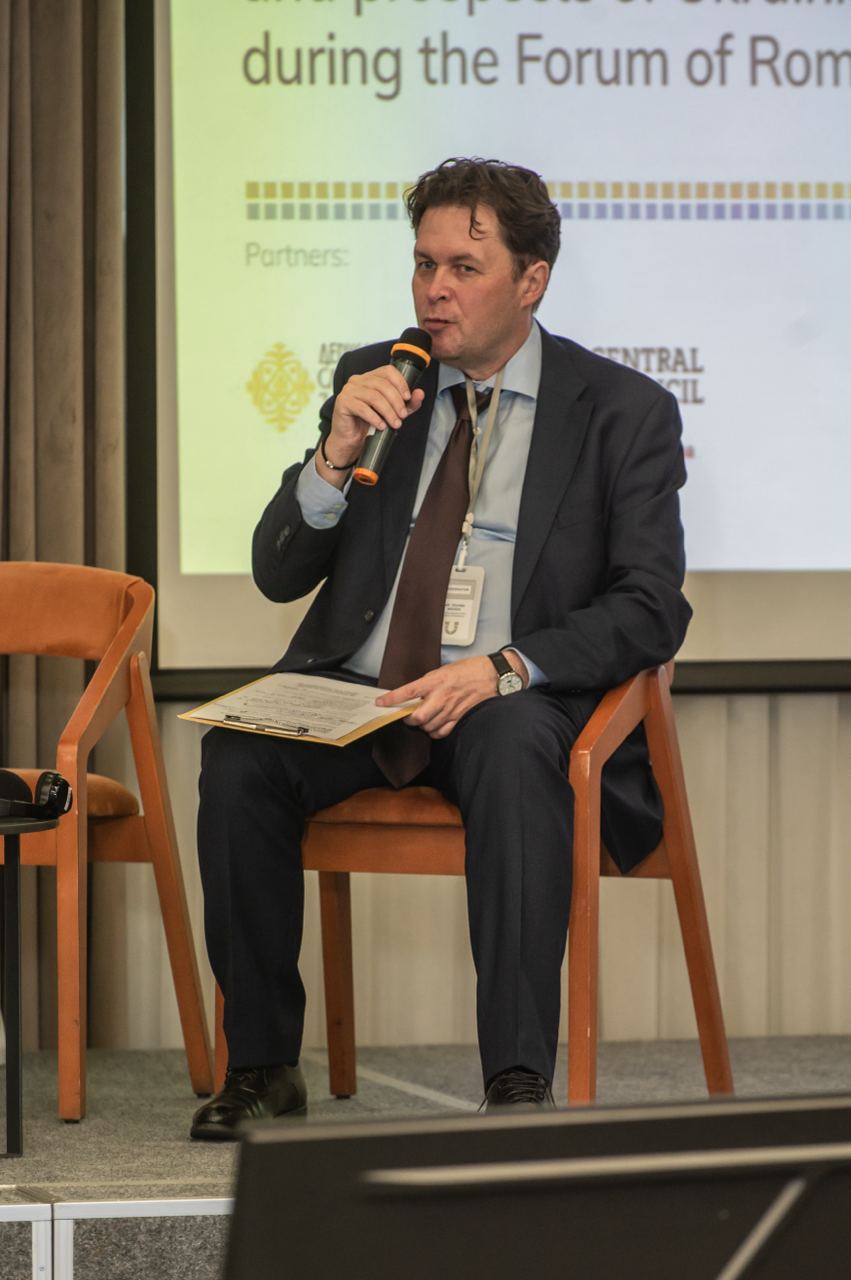
—This is the first time this Conference has taken place in Ukraine. Does this mean that certain progress has been observed here, in Ukraine, so that we would be able to fight discrimination and overcome ethnic issues? Any chance issues of ethnic minorities are gradually going to be resolved?
—After this Conference, we are going to see what kind of feedback is it going to receive. We should not keep silent about any of the issues on the agenda. After all, before the full-scale invasion, there was a number of ethnic-based assaults upon Romanis—with casualties, too. And this is something we should be pointing out; something we should address. Ukraine should show its citizens as well as the entire world that such things are inadmissible; that something like that should not exist and that something like that will be tackled immediately and strictly. That we are never going to be at peace with something like that.
Shaping an efficient ethnic and national strategy is one of the keystones of Ukraine's European integration process. There should be no doubt about this. It is obvious that, as of today, we share problems in terms of Romani perception with the aforementioned countries of Central Europe. These problems are not uniquely Ukrainian, and this is something we should be talking about, loud and clear. We are indeed living with stereotypes. This is actually a problem and we find it really difficult to deal with this problem. And, of course, we cannot count on being able to resolve this problem overnight. It just does not work like that. We need to take concrete action that will allow us to succeed in this or that area. This has to be something clearly and firmly formulated; something we should always work on. Our path towards the European Union is like a motorway that is comprised with a number of lanes. Respecting the rights of Romanis is one of the milestones, as far as this issue is concerned.
The Romani community may stand at 200,000 to 400,000 people in Ukraine; yet, 35 per cent of this community's representatives are not accepted in Ukraine
Roza Tapanova, Director of Babyn Yar National Historical and Cultural Memorial:
"Inclusiveness means accessibility and the ability to understand that this is important for all of Ukraine's citizens. The Romani Community are Ukrainian citizens. And this is why we cannot just not see them. Our Romani Community may stand at 200,000 to 400,000. Yet, thirty-five per cent of them are not accepted by the Ukrainian society. This data is horrible. It is horrible that we fail to comprehend how many Romani Ukrainians there are and why is it that no conclusions are being made and no action is taken to eliminate this inability to accept. After all, any kind of discrimination is the onset of a genocide".
– We have a law against anti-Semitism in place. It was not an easy thing to adopt it but we did it and it is an acting law. Now, representatives of Romani NGOs (ARKA including) suggest that a similar law against anti-Gypsyism should be adopted, too. What is your opinion about this?
—It seems to me that changes which the Office of the Ombudsman has emphasised (ones pertaining to the change in the disposition of the (anti-)discrimination article in the Criminal Code, the one pertaining to administrative responsibility, and then the one pertaining to the implementation of the strategy pertaining to the Romani Community) should bring about a good result. After we have the said results, we shall be able to see what it is that we should improve. I liked the way how, during this conference, the EU Representative responded as she advised us to look into the experience of Romanian and Spanish criminal court, as far as crimes against the Romani community and the ensuing investigation were concerned. We should better look into the experience at hand. In order to be able to put it into use, however, we need to know that we really know what is going on here, in Ukraine.
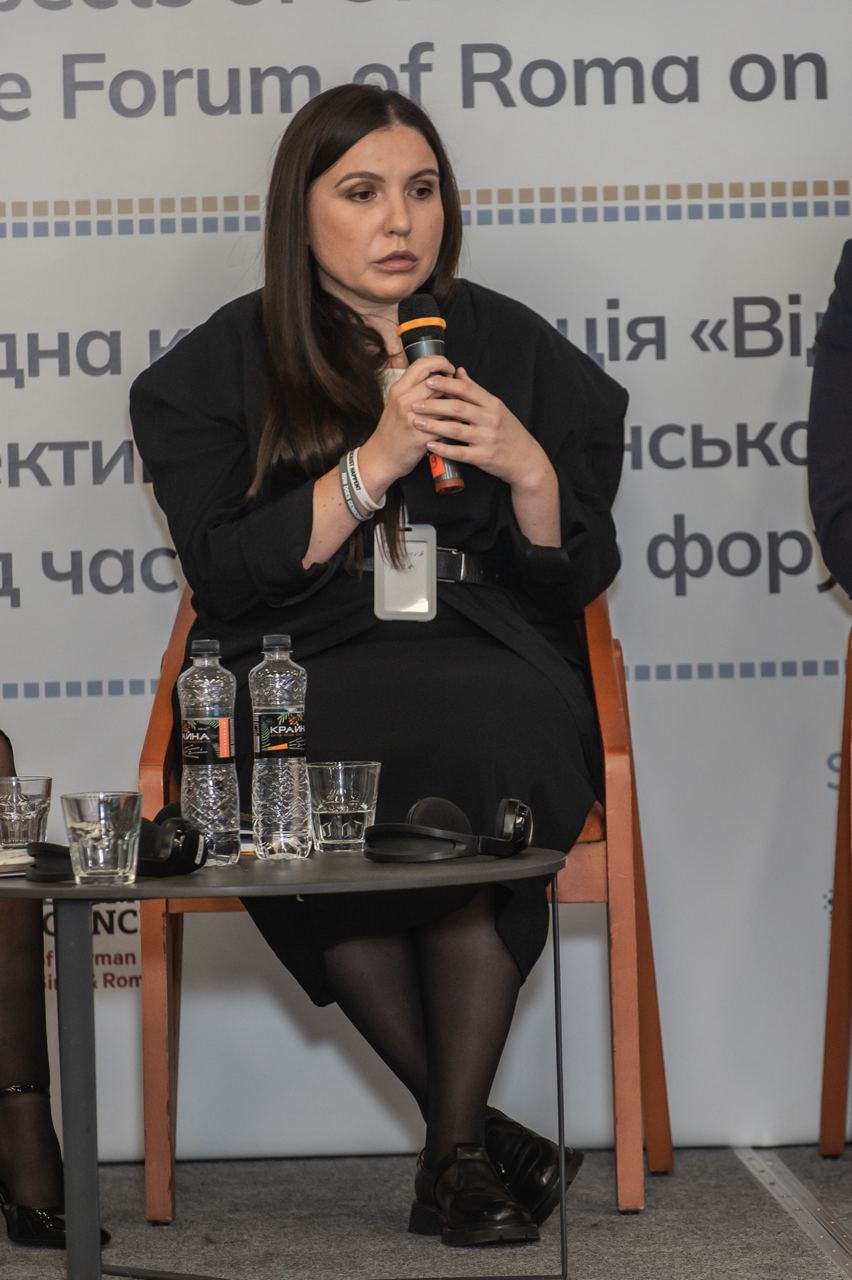
—I talked to a number of Ukrainian MPs and suggested we adopt a law against anti-Gypsyism. They responded that there is a law against anti-Semitism and suggested we co-opt Romanis into that law, too. Would that be a good idea?
—Well why not co-opt it into the law about Holodomor then, too? After all, these are all varieties of genocide. We should know about our own genocides, our history, about various types of discrimination. That said, we should not make a mash of it, otherwise we are going to devalue this and there will just be a misunderstanding. Even now, people seem to mix things up. If you just co-opt all of it, mix all of it—something that does not pertain to the principal objective of this law—you are simply going to devalue it and make it seem less important.
—As far as the collaboration is concerned, say, between the Babyn Yar Memorial and the Romani organisations. How do you reckon a possible collaboration may look like today?
—I have been lucky from the very beginning, from the moment Babyn Yar National Historical and Cultural Memorial was founded. We have an employee who is chief of a scientific department and a representative of the Romani community. His father, too, was a leader of an NGO, and so he suggested we open a monument to commemorate the crimes against the Romani community during the Second World War".
—Within the territory of the Babyn Yar memorial, there is a Romani Cart commemorating the Romanis tortured and murdered during the Second World War.
—Yes, and we have had a discussion focusing on this topic this year: one of these discussions took place within the Babyn Yar territory, in the exhibition centre, where the exhibition was opened. We are open to co-operation and ready to provide our platform and put in our effort to raise awareness of this problem and this story. Because this story is a part of the story of Babyn Yar and a part of Ukraine. If we have enough material, we shall also be able to provide it. We are ready to prepare an exhibition entitled "The Invisible Ones" and set it up within the Babyn Yar territory, so that all of these topics be covered and so that we can make people aware of them.
The Romani Community is one of the most vulnerable communities in Ukraine
Volodymyr Yakovenko, Executive Director of ARKСA Youth Agency for the Advocacy of Romani Culture, told us that his NGO and the Romani civil society sector are deeply convinced that equal participation of Romanis in the processes of restoration of Ukraine and Ukraine's accession to the EU is a prerequisite of the democratic future of our country. This engagement is an indicator of maturity of our society which values diversity and is ready to protect the rights of each and every ethnic community.
Volodymyr Yakovenko, Executive Director of ARKA Youth Agency for Romani Culture Advocacy:
"This conference is actually dedicated to the topic of reconstruction and restoration of Ukraine. The way we understand it, the reconstruction of Ukraine not only means restoration of the physical infrastructure of Ukraine but also complete reconstruction of the entire society. The Ukrainian society has to rethink and reconsider the way it used to live before the outbreak of the full-scale war; it has to understand and select the values which are near and dear to the Ukrainian society and to accept European values and European standards, as we are going to accede to the EU. And then, with this newly reconsidered attitude, we are going to proceed to building a new Ukraine. After the war ends, this is going to be a brand new country. However, we should start thinking about it and talking about this right now: which format Ukraine should choose? What kind of a policy should we devise? What kind of citizens and what kind of fellow citizens would we like to see?"
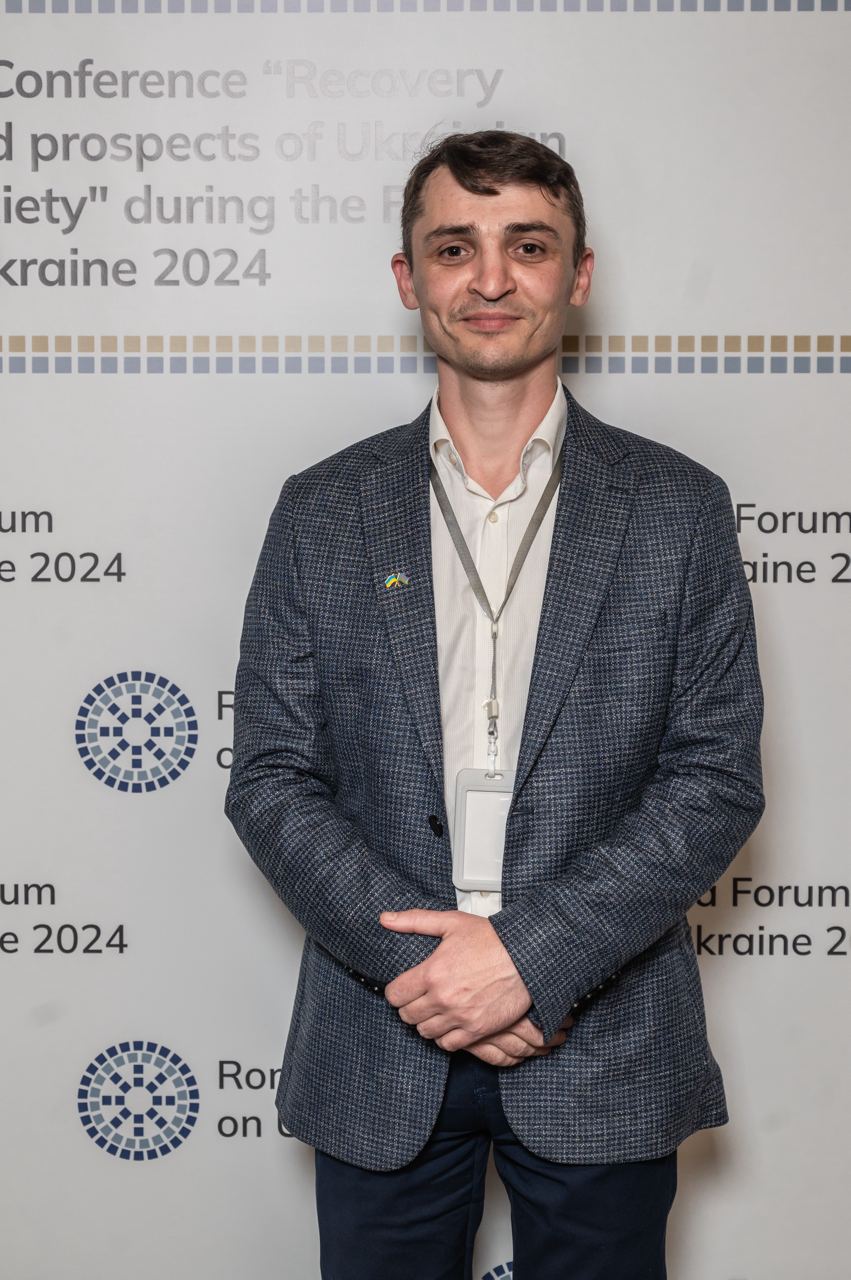
—There are basic things to discuss at the moment, basic things we want: lack of discrimination, non-existence of anti-Gypsyism. What do we have in practice?
—Today's participants have stressed that discrimination also exists in the European Union. This is something we all should recognise and be aware of. But what about the level, the intensity of discrimination? Is our country ready to accept and agree with the fact that there are certain manifestations of anti-Gypsyism in our country? That there is non-acceptance of the Romani community and Romanis, by and large? That is the difference. Presently, Ukraine recognises the fact that Romanis are one of the most vulnerable groups of population. As far as the expected law against anti-Gypsyism is concerned (anti-Gypsyism is one of the varieties of discrimination targeting the Romani community), we have so far not been able to hear a clear answer. So far, we tend to believe that such a law would be necessary. It would protect the rights of Romanis as an ethnic minority and as a stratum of the population that has been recognised by the state and is one of the most vulnerable categories of population. Most Romanis in Ukraine are young people. This indicates the fact that Ukraine as a state underestimates the potential of the Romani community as far as restoration and reconstruction of Ukraine is concerned.
—The Romani strategy is scheduled until the year 2030. What should one do in order for this strategy to be properly implemented in practice, locally?
—The Romani civil society is not particularly excited about the format of the strategy adopted by our authorities. That said, we no longer have a say in it, nor a choice: the strategy has already been adopted and now we should be of assistance to the state authorities and help the state adopt it. It could have looked way better—particularly if it were not a strategy but a programme. Because a strategy differs from a programme in that a programme is supported by the state in the course of its implementation and a programme receives funding from the state. Romani NGOs have been developing such a programme; we have addressed state institutions and asked them to contribute to the said programme; we have submitted it to the Ukrainian State Service for Ethnic Policy and Freedom of Conscience for examination, suggesting that they accept our proposal—even with changes and amendments, but as a programme, not a strategy. We have not been heard and they adopted a Romani Strategy instead. Every year, we try to come up with suggestions, with recommendations as how measures and actions taken may be improved in the implementation of this strategy. In reality, however, policies and strategies are being shaped in Kyiv but the implementation takes place locally.
Article prepared using materials of the Ukrainian Radio.
See also
- АРКА візьме участь у Cafe Kyiv 2026
- Roma Women’s Testimony from Ukraine at the United Nations Holocaust Memorial Ceremony
- Roma rights and the challenges of war: results of a discussion in Berlin
- Roma Inclusion in Focus – Strengthening Partnerships Between Ukraine and Germany
- The film “Named Voices” was presented at an international conference
- ARСA representative participates in OSCE conference on human rights
- Babyn Yar: And the Thousands of Ravines of Memory. How We Reflect on the Past During Wartime
- Voices of Memory and Future: ARCA’s Participation in the 5-Year Anniversary of the Program
- ARCA Representatives Hold Lecture at the MFA to Mark Roma Genocide Remembrance Day
- Roma Programme Featured at One of Europe’s Largest Conferences
- In New York City, the 69th session of the UN Commission on the Status of Women is underway
- A screening of a movie about the Roma Genocide took place in Berlin
- Michael Roth: “Roma are the largest ethnic community. And its contribution should be recognized”
- Humanitarian Aid, Human Rights, Equality: Challenges faced by the Roma Community
- Participation in the panel discussion “Challenges Faced by Ukrainian Roma in the Ukraine”
- A networking meeting between civil society participants
- We are already planning the restoration of Ukraine: an international conference has begun
- Participation in DEZIM CONFERENCE 2024
- The Art of Memory: How the Romani Tragedy Resurrects from Oblivion
- The Forum dedicated to the 140th Anniversary of the Female Movement in Ukraine
- "Romanis must be included in the processes of Ukraine’s Reconstruction", – Volodymyr Yakovenko
- The event "Roma contribution to the Recovery of Ukraine"
- The Council of Europe Dialogue with Roma and Traveler civil society
- Conference on Ukraine's recovery in Berlin
- Educational event "Roma in Ukraine - fighters for democracy, human rights and justice" was held
- Ukrainian Decolonization: the Untold Roma Stories
- Public event "Roma in Ukraine – Fighters for Democracy, Human Rights and Justice"
- Mapping the Challenges faced by Ukrainian Roma in a War Time and Overcoming the Obstacles
- Cafe Kyiv event took place in Berlin
- Respect, Recognition and Rights of National Minorities in Ukraine
- Consultation meeting on opportunities for Roma youth realization
- Meeting with a member of the Bundestag
- Conference “Roma as an integral part of Ukrainian society”
- Forum of Roma civil society
- "The Russian War Against Ukraine and Its Consequences for Roma" conference
- First day of Roma Civil Society Forum
- The Sastipe project
- The project Through my mind
- DIKH HE NA BISTER - Roma Genocide Remembrance Initiative